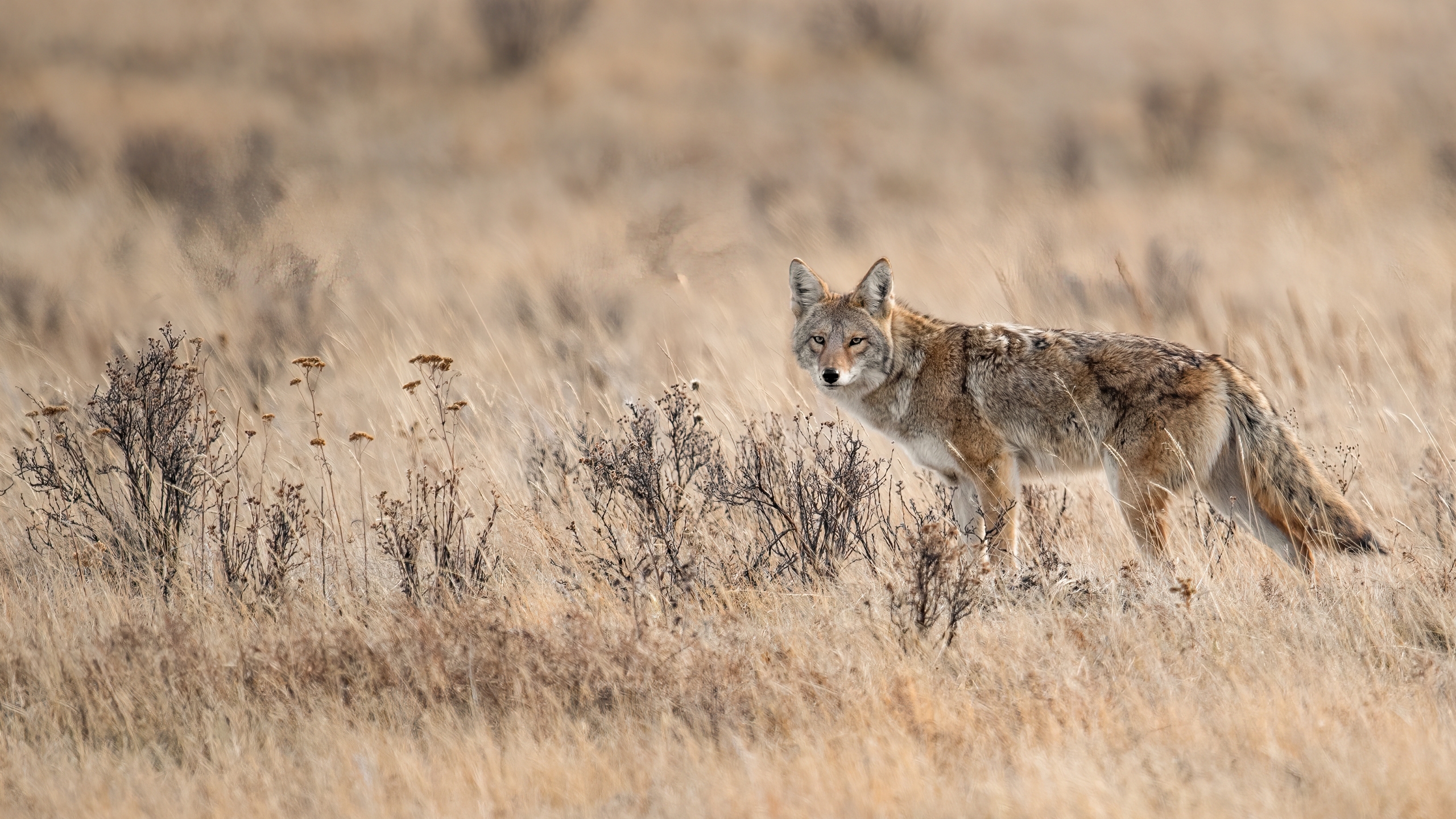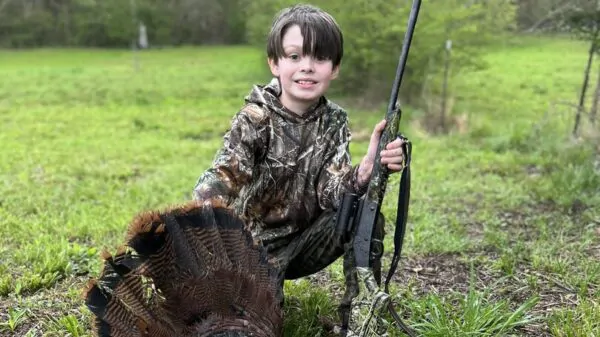Alabama Governor Kay Ivey signed legislation on April 15 to allow Alabama hunters an opportunity to hunt feral swine and coyotes at night. Senate Bill 264 was sponsored by state Sen. Donnie Chesteen, R-Dothan, and carried on the floor of the House by Rep. Danny Crawford, R-Athens, who chairs the House Agriculture and Forestry Committee.
Crawford said that “this is a conservation bill” and that hunters must still have permission from the landowner in order to do this.
Alabama hunters can already hunt both species, neither one of them native to the state of Alabama, 365 days out of the year between first daylight and sunset. The new legislation will allow Alabama Department of Conservation and Natural Resources Commissioner Chris Blankenship to establish a season for hunting feral hogs and coyotes at night. Farmers have already been able to do this with a special depredation permit from the ADCNR.
When the season is finalized, Alabama residents will be able to purchase the special license for just $15. Non-residents of the state can get the license for $51. This is not being done for a pursuit for more revenue, but rather to deal with the exploding populations of the two invasive species. Even though there is no bag limits or seasons for hunting hogs or coyotes, their populations continue to climb and with the slightest of hunting pressure both turn nocturnal, when they are naturally more active anyway.
Matt Weathers is the Chief of Enforcement with the Alabama Wildlife and Freshwater Fisheries (WFF) Division of ADCNR.
“To this point in our state, those who wish to hunt feral swine or coyotes during nighttime hours have to get a permit that is only issued to landowners,” Weathers said. “Those landowners can list friends, family or delegates on the permit to take those animals at night for crop damage, property damage or livestock damage. This is done through special permitting through the local WFF District Office.”
“The new law provides for a license that allows anyone in the state to hunt feral swine and coyotes at night by buying a license to hunt on any private or leased property where they have permission to hunt,” Weathers explained. “So, if you lease a hunting club, if the person or corporation you lease that property from allows you to hunt at night, you can purchase the license to hunt those animals at night on your hunting club. And you can do that without the landowner coming to us to get a permit.”
“It represents a new hunting activity for the state, and it will enlist as many as 200,000 hunters in this fight against two insidious predators,” Weathers continued. “So, a new hunting activity; that’s a good thing. You have more feral swine and coyotes being removed from the state; that’s a good thing, too. It’s a win-win.”
Weathers said the depredation permits will continue to be available to landowners who prefer not to buy the new license. “However, as long as the landowner gives permission, you can buy that new license to hunt at night. This streamlines the process and provides the ability to hunt on very short notice.”
The USDA estimates that wild hogs do $50 million a year in private property damage in Alabama annually. That likely pales to the damage they do to wildlife habitat as they compete with native wildlife, like white-tailed deer and wild turkeys for food while preying on the nests of ground dwelling birds like quail and native reptiles.
Coyotes on the other hand target whitetail fawns and can have significant impacts on populations of white-tailed deer.
“This license does not allow you to take any other game animal at night,” Weathers added. “It’s a good way to control predators on your hunting club or property. And this gives you the opportunity to utilize that property or hunting club during the months when it’s a little too hot to hunt during the daytime. It gives you a little more value in your hunting lease.
“All parties involved, except for the feral swine and coyotes, are going to benefit from it,” Weathers explained.
Several regulations will be amended to allow for equipment used for hunting at night.
“Those who buy the license will be able to use equipment that has heretofore been prohibited,” Weathers added. “During the established season, you will be able to use night vision or thermal optics. You can have lights attached to your firearms. Those technologies are emerging and make the taking of these animals a lot more efficient.”
Hunting at night, especially with other people, presents new safety concerns.
“We want everybody who hunts feral swine and coyotes at night to think about safety,” Weathers said. “Know where your property lines are. Know where your fellow club members are when you are hunting. Always properly identify the target before you shoot. All the commonsense practices we follow during daylight hours will need to be adhered to during nighttime hours. We need everybody to be very mindful of their actions because it is a new hunting activity in this state. With any new activity, you’ve got to think safety.”
Alabama is not the first state to give hunters this option.
“In a lot of states, nighttime predator hunting is very popular,” Weathers said. “It’s big business in some areas. In Alabama, it has only been done by special permit. By doing this, it relaxes those restrictions and lets that style of hunting grow in this state. That’s a good thing. Hunting has been in decline for decades across the nation, but some of these specialty styles of hunting, nighttime predator hunting specifically, has just exploded. People are really getting into it.”
“As the prices have come down on equipment like suppressors, AR-15-style hunting rifles, night vision and thermal optics, these things are becoming more common and are becoming more accepted in hunting,” Weathers explained. “This is just an example of us trying to adjust regulation and law to account for the evolving manner in which Alabamians hunt. The feral swine population and the coyote population are certainly increasing in Alabama. These are animals whose populations can stand more hunters out there pursuing them.”
Chuck Sykes is the director of the WFF.
Sykes said that the 2021 season for hunting feral swine and coyotes at night will likely start on July 1 and run until November 1. In following years, the nighttime season will likely start on February 11 and run until November 1.
“The way the bill was drafted, it gives the Commissioner the ability to set the season so we can evaluate and make sure this goes well,” Sykes said. “We can amend the dates down the road if it makes it better. This time frame is when most of the depredation permits are issued.”
“We see this as an opportunity to streamline the process and make it easier to manage for us and the landowner,” Sykes said. “This also opens the possibilities for others. Say you lease 1,000 acres from a timber company. You had to get the timber company to apply for the depredation permit and then put you on it. Now, if you have the hunting lease and the timber company is okay with it, you don’t have to bother them. You just go online and get a license.”
The ADCNR is making the permitting process simpler and easier.
“If you have college kids who come home for the weekend. That’s one thing we ran into. Farmers had kids come home from Auburn and wanted to take their buddies hog hunting,” Sykes said. “They had to call our office and amend their permit. Now all they have to do is get online, get the license and say, ‘Y’all have at it.’”
While the new licenses are a tool, Sykes has no expectations the new license will have a significant impact on the feral swine population.
“We don’t think this is the silver bullet,” Sykes said. “We’re not saying going hunting at night is going to eliminate the hog problem, because it’s not. What we are doing is giving people more opportunity to remove more pigs and coyotes if they choose to do so. It is another tool to reduce the number of predators. Predator control is a big buzzword right now. We’re giving you the opportunity to do what you think is best to manage your property.”
The Senate passed SB264 28 to 0 on April 1 and passed the House on April 13 by a vote of 92 to 0. Gov. Ivey signed the legislation on April 15.
Tuesday will be day 28 of the 2021 Legislative Session.




















































